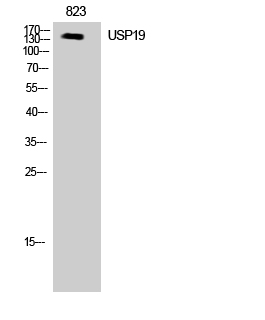
| WB | 咨询技术 | Human,Mouse,Rat |
| IF | 咨询技术 | Human,Mouse,Rat |
| IHC | 1/100-1/300 | Human,Mouse,Rat |
| ICC | 技术咨询 | Human,Mouse,Rat |
| FCM | 咨询技术 | Human,Mouse,Rat |
| Elisa | 1/20000 | Human,Mouse,Rat |
| Aliases | USP19; KIAA0891; ZMYND9; Ubiquitin carboxyl-terminal hydrolase 19; Deubiquitinating enzyme 19; Ubiquitin thioesterase 19; Ubiquitin-specific-processing protease 19; Zinc finger MYND domain-containing protein 9 |
| Entrez GeneID | 10869; |
| WB Predicted band size | 130kDa |
| Host/Isotype | Rabbit IgG |
| Antibody Type | Primary antibody |
| Storage | Store at 4°C short term. Aliquot and store at -20°C long term. Avoid freeze/thaw cycles. |
| Species Reactivity | Human,Mouse,Rat |
| Immunogen | Synthesized peptide derived from the Internal region of human USP19. |
| Formulation | Purified antibody in PBS with 0.05% sodium azide,0.5%BSA and 50% glycerol. |
+ +
以下是关于USP19抗体的3篇参考文献的简要概括:
1. **文献名称**:*USP19 modulates autophagy and antiviral immune responses by deubiquitinating Beclin-1*
**作者**:Xing J, Weng L, Yuan B, et al.
**摘要**:该研究通过使用USP19特异性抗体进行免疫共沉淀实验,发现USP19通过去泛素化Beclin-1调控自噬过程,并影响宿主对病毒感染的免疫应答。
2. **文献名称**:*The deubiquitinase USP19 regulates p53 stability and cancer cell survival*
**作者**:Li Y, Jiang D, Zhang Q, et al.
**摘要**:研究利用USP19抗体进行Western blot和免疫荧光实验,证明USP19通过去泛素化p53调控其蛋白稳定性,影响肿瘤细胞的凋亡和化疗敏感性。
3. **文献名称**:*USP19 mediates the stabilization of misfolded membrane proteins through interaction with HSP90*
**作者**:Tanno H, Komada M.
**摘要**:通过免疫沉淀和蛋白质组学分析(使用USP19抗体),发现USP19与分子伴侣HSP90协同作用,参与错误折叠膜蛋白的质控,维持内质网稳态。
以上文献均通过USP19抗体验证其在蛋白质稳定性、自噬或疾病机制中的功能。如需具体发表年份或期刊信息,可进一步补充检索。
The ubiquitin-specific protease 19 (USP19) is a deubiquitinating enzyme (DUB) belonging to the largest family of cysteine proteases that regulate protein stability by removing ubiquitin chains from target substrates. USP19 plays multifaceted roles in cellular processes, including protein quality control, endoplasmic reticulum-associated degradation (ERAD), cell cycle regulation, and immune response modulation. It is implicated in diseases such as cancer, neurodegenerative disorders, and muscle atrophy, where dysregulation of ubiquitination pathways contributes to pathogenesis.
USP19 antibodies are essential tools for studying its expression, localization, and functional interactions. These antibodies enable researchers to detect USP19 in various experimental setups, such as Western blotting, immunohistochemistry, and immunofluorescence, helping to elucidate its tissue-specific roles. USP19’s interaction with substrates like HSP90. IκBα, and misfolded proteins underscores its importance in stress response and proteostasis. Recent studies also highlight its potential as a therapeutic target, particularly in cancers where USP19 overexpression correlates with tumor progression or drug resistance.
Validated USP19 antibodies are critical for distinguishing its isoforms and assessing post-translational modifications. However, challenges remain in ensuring antibody specificity due to structural similarities among USP family members. Ongoing research continues to explore USP19’s regulatory mechanisms and disease relevance, driven in part by advanced antibody-based methodologies.
×